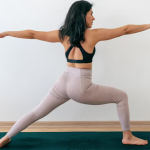Growing up in India, Dr. Deepti Sastry started yoga at the tender age of eight. She is a deeply intelligent person, and self-proclaimed ‘philosophy junkie’, whose commitment to yoga and yoga philosophy pervade her whole life.
We are lucky enough to have her as the 500-hour Philosophy Module teacher here at YogaLondon, but that is just a small part of her achievements. Working full-time in the International Development sector, she is also mum to an almost three-year-old – but she always finds time for meditation.
1. What was it like learning yoga as a child in India?
I primarily did it because I didn’t want to go for a run in the mornings! At 6 am in the morning at the boarding school I went to we’d get kicked out of bed, and you’d either go for a run or you’d do yoga, and yoga seemed the lesser of the two evils. It was very pared back – the concept of a yoga mat didn’t exist, there was a big carpet and you brought a towel or a sheet and you sat yourself down.
The emphasis of the yoga was focused on cleansing the immune system and we also did the Sat Karmas [yogic cleansing rituals] and the six kriyas. As part of this immune-boosting yoga, we would also be expected to take cold showers and walk barefoot on the dewy grass on winter mornings, all things to build immunity. I loved it. I was eight when I started so we would also do fun things, more like gymnastics as well as performances of yoga, and at that point, it was just fun.
2. Did yoga teaching come naturally to you?
No! I never intended to be a yoga teacher.
In India, you’re either too skinny or too ‘plumpy’ and all my life my sister was the skinny one and I was the plumpy one. So when I was in my twenties I got into yoga largely because it helped make me feel good about my body, so I would do a lot of dynamic vinyasa flow. And that’s where I met Rebecca [Ffrench, Co-founder of YogaLondon] – at one of these classes. I loved her classes and hanging out with her. At that time, in 2009, she was setting up YogaLondon, and there weren’t that many teacher training schools around. She asked me if I wanted to train as a yoga teacher. I was interested because I felt I’d plateaued in my practice and, even growing up in India, I hadn’t been taught any theory.
So I signed up because I was curious, wanted to know more, and to grow my own practice. I was in the very first batch of YogaLondon graduates.
3. What did you do when you qualified?
At the end of my yoga teacher training, Rebecca asked me if I wanted to become an apprentice, which I did for a year, then I quit my job and started teaching full time. I did that for another year and then realised I didn’t enjoy teaching full time, so I went back to my job, but was still teaching yoga every weekend.
After a while, I realised working and teaching non-stop was ridiculous, so I stopped doing that. Now I teach 3 weekends, twice a year. I’ve finally got the balance right.
4. How does your knowledge of the Yoga Sutras of Patanjali inform your practice?
My practice is completely based on the sutras – there is nothing outside of it. Most yoga teacher training, especially at the 200-hour level, is fundamentally about teaching asana health and safety. And while that’s important, that is really not yoga.
I think a year after I finished training I really wanted to know more. So in 2010, I went to study at the school of T Krishnamacharya and I did a month-long course on the sutras with them. And apart from this year, I go back at least once a year to study with them. For me, there is no yoga outside the sutras.
5. What’s the most rewarding thing about teaching the Philosophy Module for YogaLondon?
The most rewarding thing is when people have that ‘AHA!’ moment. When they realise why it is that they wanted to become a yoga teacher in the first place. It’s because you want to deal with the neurotic human condition, and you learn how to lead a peaceful human life – through yoga.
In his audiobook The Yoga Matrix Richard Freeman says it beautifully. To paraphrase – you’ve probably tried everything, from drugs through to therapy, and you’ve come to this room because you know something’s not complete. And that’s the bit that I find rewarding, when people acknowledge that.
6. How has yoga helped you cope during lockdown?
My yoga practice is a jigsaw puzzle, so my asana and pranayama practice have come from the Krishnamacharya tradition and the Bihar school of yoga, and my meditation practice is from Insight meditation and Buddhist practices.
However, during lockdown, I have stripped back everything because I have a full-time job and a young child at home, and something’s got to give! What’s been essential for me to keep me sane, and to keep my brain from getting anxious and busy, is my meditation practice. Normally I’ll do 40 minutes in the morning and 10 minutes last thing at night.
7. Do you have a pose that you love to hate?
I love to hate Utthita Hasta Padangustasana A, B, C, and D. I like it, but I don’t like it. I feel like it’s one of those poses, I never know how it’s going to come out. I suppose that’s the point of this pose that it’s a bit of a curve-ball, and throws you off balance.
8. Who are your yoga inspirations?
There’s a teacher of mine in the school in India where I go to study called Sangeetha. She’s this tiny, wiry, petite woman, who glows. I remember I was there doing a chanting course, and you get so caught up in the ‘doing’ – the meter, the rhythm, the precise pronunciation, that you forget why you’re doing it. And one day we were going into class and she looked at me and said, ‘Stop. Feel it.’ That’s the point, ‘feel it’, and it just helped to shift my perception – so I partly adore her, and am partly frightened of her.
I also absolutely love my meditation teachers –Martin Aylward, he’s been teaching an online sangha sitting every day since the lockdown started. Chris Cullen, a mindfulness-based cognitive therapist and he’s just unbelievable. And Martine Batchelor, who was a Zen Buddhist monk who disrobed and re-joined society.
9. How does yoga inform your views on politics and social justice?
Everyone just needs to calm the f**k down! I just feel like people get so caught up in their own view and what they think is right that there is no room for a conversation anymore. And honestly, there are no easy answers to any of this [what’s going wrong in the world] but at least you can have an empathetic conversation, which we are sorely lacking at the moment.
We need to start acknowledging that none of us is correct and that there is no correct. I think that’s why Utthita Hasta Padangustasana kicks my ass because every day there is a different way to do it.
10. Do you have a view on whether the West has culturally appropriated yoga?
If we have to think in terms of the binaries of East and West, then, yes, there is cultural appropriation, but I don’t necessarily find it problematic. I just think it’s strange that people find solace in things they don’t necessarily understand. However, I’m perfectly happy with people taking mantras and chanting and doing crazy things with it. If it brings you peace and you’re not hurting anyone else, then who cares?
However, one thing that the West has done with yoga is to make it much more physical, which I do have a problem with. With the West’s preoccupation with the body looking a certain way, I can understand why yoga has been re-framed to fit that narrative, but it’s not helpful, and hopefully, we’ll come out of it.
11. What advice would you give to a newly qualified yoga teacher?
Slow things right down. Take time to understand your body and your mind better, and then figure out what you want to emphasise in your practice. I know I didn’t! I went straight from qualifying to apprenticeship, to teaching full time, and then it’s taken me almost ten years to strip it back. I still find myself reaching for the next course, the next challenge, and it’s just not helpful.
12. What’s the essence of yoga for you?
If everyone can just stop for two minutes a day, and watch their breath, then that’s already amazing. Yoga is not about quantity, it is purely about intentionality. You don’t need to do four hours of kriyas and asanas and pranayama and meditation all in one day, nobody has four hours!













